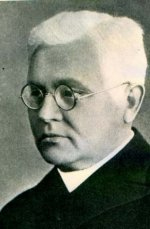
Juozas Tumas-Vaižgantas is one of the great Lithuanian writers. He is an outstanding and noble personality, a creator of wonderful artistic works. The creative heritage left by Vaižgantas has the biggest value of the writers of his period.
Juozas Tumas was born on September 20, 1869, in the village of Malaišiai, Rokiškis county, in a family of a farmer. The home and homeland environment has introduced J.Tumas-Vaižgantas to a linguistic and ethnographic heritage of incredible richness, cultivated the sense of individuality and independence, love of people and optimistic view of life. J.Tumas had finished the elementary school in Kunigiškiai in two years and entered Daugpilis realgymnasium in 1881. The gymnasium was dominated by a positivist spirit of freethinking but it did not influence J.Tumas. The national consciousness was stimulated by "Aušra", Russian classical literature inspired wish for literary work. He had graduated the gymnasium in 1888 and entered Kaunas clerical seminary the same year. In the Seminary J.Tumas took part in national movement, was a member of a secret Society of Lithuanian Supporters created by Lithuanian patriotic clerics, in the Society of St. Kazimieras he had started his literary work.
In 1893 Vaižgantas graduated from the Seminary and was initiated to priesthood. In 1894 he was appointed a vicar in a Mintauja Lithuanian parish. Because of the conflicts with local priests he was sent to the province of Samogitia - Mosėdis. There J.Tumas started his great patriotic activity. He was one of the organisers, editors and distributors of "Tėvynės sargas" (The Guard of the Homeland). In 1898 J.Tumas was sent to Kuliai as a vicar. In 1900 he had started publishing a magazine for intelligentsia "Žinyčia" (Knowledge House). In 1901 J.Tumas was relocated to Micaičiai. His Lithuanian activity was opposed by Polish partisans who have complained about it to J.Tumas' church authorities. The complaint was taken into account and the authorities forbade J.Tumas to publish anything in periodicals without permission of the bishops. In 1902 J.Tumas was sent to Vadaktėliai where he saw the return of Lithuanian print. He participated in the Lithuanian seimas, established Lithuanian schools, organised a Lithuanian local authority in the district.
In 1906-1911 J.Tumas lived in Vilnius and worked in the editing offices of "Vilniaus žinios" (Vilnius news) (1907), "Viltis (Hope) (1907-1911), "Ryto garsas" (Morning voice) (1914).
In 1911 J.Tumas had been appointed a parson of Laižuva. He had decided to undertake literary work after his hard toil in journalistic field, but had departed to America to settle the affairs of the "Saulė" society. He spent there three months. After his return to Lithuanian he published a book about the life of emigrants. In 1914 J.Tumas was removed from the post of Laižuva parson and want to Ryga where he worked in the editing office of "Rygos garsas" (Voice of Ryga). In 1915 J.Tumas was invited to Petersburg to work in a central Lithuanian committee to support the persons who had suffered from the war. In Petersburg he became active in political field. He had created the party of National Progress, took part in the seimas of Petersburg Lithuanians, participated in the Conference of Lithuanians in Stockholm.
In 1918 J.Tumas has returned to Lithuania. In Vilnius he had joined the committee to support the persons who had suffered from the war, edited "Lietuvos aidas" (Lithuanian Echo). In 1919 he started to publish a newspaper "Nepriklausoma Lietuva" (Independent Lithuania). In 1920 J.Tumas had moved to Kaunas. He had been appointed a rector of Vytautas Magnus church and stayed in this post till 1932. The other duty of J.Tumas in Kaunas was his work at the University. In 1922-1929 he was teaching history of Lithuanian literature. In 1929 he was awarded the honorary doctoral degree. Apart from his main duties, J.Tumas was a member of different organisations, participated actively in cultural, public and political activities, edited magazines, wrote fiction and journalistic articles.
J.Tumas died on April 29, 1933. He is buried in Vytautas Magnus Church.

 lt
lt
